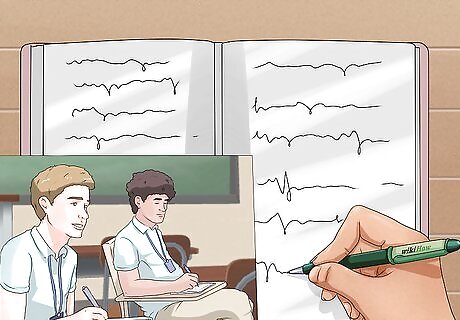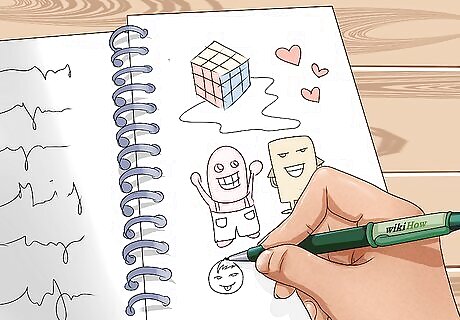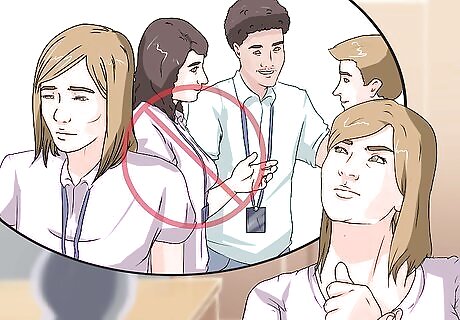
views
Listening in Class

Identify distractions. Listening will help you stay awake; however, many students become easily distracted, which results in not listening well. In order to combat distractions, you must identify internal or external “triggers.” Internal distractions are mental or emotional. Examples include thinking about a disagreement that you had with someone, the errands that you need to complete, or even what homework will be assigned. External distractions are harder to control since they come from other people and your surroundings. Someone might be tapping a pencil, there could be construction going on outside or in the building, or the speaker’s style might be annoying.

Eliminate distractions. Now that you've learned to identify distractions, you can avoid them. Some types of distractions are harder to avoid, such as having migraines or caretaking for a sick parent. However, when you notice that you are distracted, bring yourself back into the moment.

Choose your seat wisely. Avoid sitting by the door, especially if it is open and you can hear hall noise. Sit in the middle of the room toward the front. Make sure there isn't anything obstructing your view. Above all else, don't sit in the back! Teachers do not remember students who do that, which is not to your benefit.

Pay attention to your teacher. Teachers will do certain things to emphasize key points. They will use signal phrases like, "You need to know this....," "Nurses should understand," or the more blunt, "Write this down if you want to pass the test." They might use their voice or use body language to make ideas stand out. Often, they'll repeat what you need to know. Additionally, they will write down crucial information on the board or display it on an overhead.
Developing Note-Taking Strategies

Find a note-taking strategy that works for you. There is no one way to take notes, but there are some best practices that you can follow. It is useful to identify which strategy or combination of strategies produces the best results. Translating the instructor's lecture into your own words keeps your brain awake. The positive effect is that you will likely stay awake. Carefully choose information from PowerPoints or lectures. If you write down every detail, you won’t get the big picture. Plus, you can probably access the PowerPoint again if you ask the instructor. Use the margins of the textbook, your notebook, or post-it notes to list unfamiliar references or vocabulary words. Use neon-colored pens and highlighters to mark the most important information. Those bright colors might stop you from snoozing, too!

Handwrite your notes. This information may sound surprising, but it’s true! Handwritten notes are superior to notes taken on a laptop. Those who write by hand are better equipped to understand and use the content than those who use computers. What a great reason to keep hand-writing those notes!

Move your hand constantly. Even if you’ve gotten enough sleep, staying awake for an entire class can be challenging since many classrooms are uncomfortable and lack visual stimulation. They might be too hot or too cold, have dull wall colors, and/or lack art on the walls. However, taking notes can help you fight that sleepy feeling. The physical motion of taking notes keeps the blood circulating, which helps your brain stay on task. If the teacher pauses or fusses with the overhead projector for long periods, keep that hand moving by creating a to-do list. Feel free to doodle (draw animals, shapes, logos, etc). Doodling isn't distracting; in fact, it usually aids brain processes and helps students become interested in the course content.
Participating During Class

Ask questions. Coming up with questions stimulates the brain and makes the class more engaging. Many students dislike speaking in front of their classmates. It is understandable to feel uncomfortable or awkward, but at least give this strategy a shot. You might alleviate that boredom. During lecture, if the instructor speaks too quietly or too quickly, ask him or her to repeat the information. If the instructor leaves something out or is unclear when giving directions, ask for clarity. For example, if he uses a word you don’t know, ask what it means. If she does not mention a due date, ask her when the assignment is due.

Get involved in group discussion. If you have some knowledge or a personal experience that is relevant to the content, don’t withhold it! You are more likely to make friends if you speak up during group activities and get to know people. Someone that you thought was weird or dorky might become a confidante by the end of the course!

Converse with your teacher. Instructors sometimes feel unappreciated. Even the grouchiest teacher might perk up, though, if you show some interest in him or her. Acknowledge an especially useful lesson, chat the instructor up about an interesting concept after class, ask for career advice, or take interest in his or her family life (ask how a child or even the dog is doing). If you get to know the instructor, you might be less irritated during class.
Thinking Positively

Recognize negative thinking. If you continuously attend boring classes with a negative mindset, you waste energy, you probably won’t make friends, and you won’t learn much, so it’s important to recognize unrewarding thoughts and to avoid them. Thinking about how much you hate the class is unproductive. It will just put you in a bad mood, which might last the rest of the day. If you emit a crabby aura, other students probably won’t want to work with you on group projects. One of the greatest benefits of attending any class is meeting new people, so don’t lose out on that! You will not absorb the information. If you choose not to read or do other assignments and/or text during lessons instead of listening, taking notes, and participating, you won’t retain the course content.

Reverse your attitude. Gather up your strength and turn those negative thoughts into positive ones! It will be harder to counter negative thinking on some days, but just try so that the humdrum class will become more tolerable. Remind yourself that the class only meets a few hours per week. Remember that not everyone in this world has the opportunity to learn. Obtaining an education is a privilege. Realize that gaining knowledge is a good use of time.

Reap the benefits. There are so many reasons to be a positive thinker. Being more upbeat will make class better and it will improve your life in general. When you limit pessimistic thinking, you will feel better mentally and emotionally. Your grade in the class or at least the understanding of the content will improve. Your stress level will lessen. Overall, you will probably become a more likeable person, in or out of class.




















Comments
0 comment